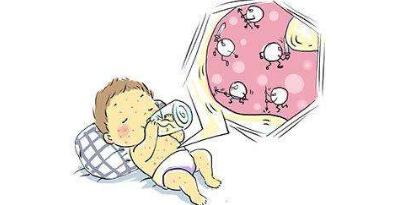
Babies are in a relatively weak group are prone to various diseases, and the body's various sweat glands are not well developed, will appear skin inflammation and eczema, so in peacetime parents need special care.
After eczema occurs, the baby should look for the cause of induction, and then give correction, if it is due to food intolerance, it is necessary to take systemic or local comprehensive treatment.
When the baby appears eczema, can not use soapy water or hot water hot wash, but also avoid the sun, the baby can not have sweater or chemical fiber fabric and skin direct contact, not good for the skin, local skin can not be used at will.
3, can not be treated in different ways at the same time, for the acute phase can be applied with external cream, or 1% of the boric acid solution for wet compress. Subacute phase can be bathed with warm water every night, and then smeared with calamine lotion, can stop itching, anti-inflammatory, in the chronic phase with warm water cleaning skin, and then apply cream.
4, if the baby's eczema itch more uncomfortable, need to timely to the dermatology examination and treatment, this is more assured. And sometimes it may not be eczema, so it doesn't delay the condition.
 Causes of eczema in infants
Causes of eczema in infants
Children age in the emergence of eczema, they are also a great torment, so in daily life, to such a baby special care, so what is the cause of infant eczema?
1. Genetic allergies cause eczema in children, and sometimes foods that contain different proteins can cause eczema, such as milk, mutton, beef, eggs, fish and shrimp. There are some food additives, preservatives, beverages and so on can also lead to eczema.
Some physical factors in the living environment, such as climate change, over-warm clothes and bedding, excessive indoor temperature, excessive humidity or excessive cold, or too often with soap hot water bath. These can stimulate the baby's skin and lead to eczema.
Infants in the neonatal period, because the mother will transfer estrogen to the fetus, this will lead to increased sebum in the newborn, prone to seborrheic eczema.
4, if the newborn excessive nutrition obesity, at this time will be because of appetite and lead to excessive food, it is easy to cause vomiting, diarrhea, indigestion or constipation and other gastrointestinal dysfunction, to this condition aggravated.
Symptoms of eczema in infants
Infants have different symptoms of eczema because of different causes. What are the symptoms of infantile eczema? Let's get to know.
1. Seborrheic eczema, which can occur in infants within three months. Eczema usually occurs between the eyebrows, cheeks, and forehead. The skin in these areas is flushed and covered with greasy crusts and thick yellow pulp crusts overhead. Later, the back neck and armpit and groin will also be flushed, rubbed and exudated, which is seborrheic eczema, which usually improves after six months.
2, exudative eczema, three to six months of obese infants are more common. Two cheeks will have red papules of the size of a grain of rice, some